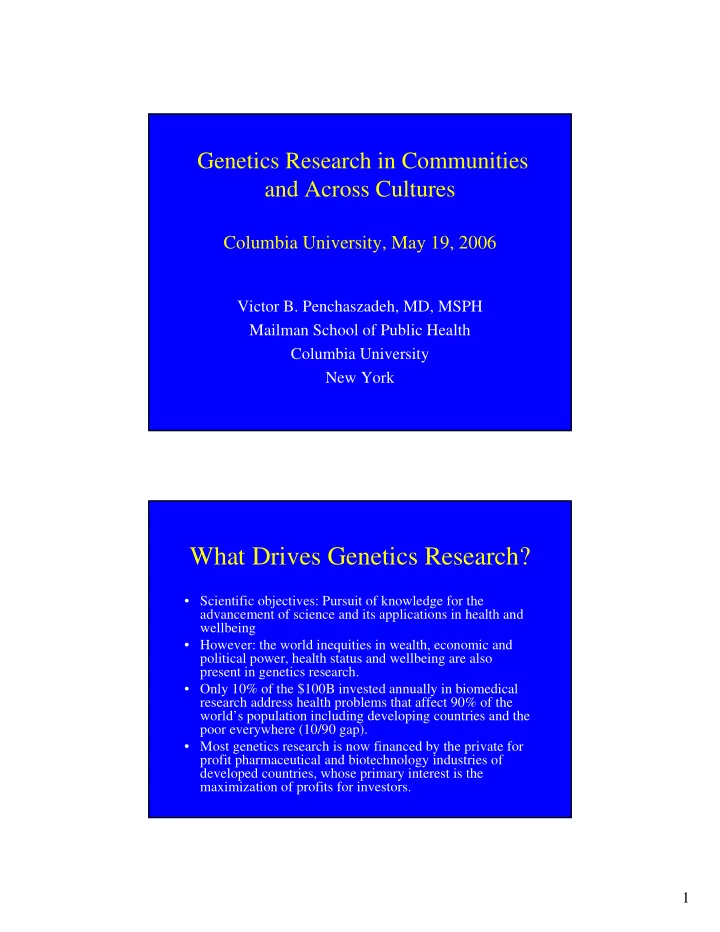

Genetics Research in Communities and Across Cultures Columbia University, May 19, 2006 Victor B. Penchaszadeh, MD, MSPH Mailman School of Public Health Columbia University New York What Drives Genetics Research? • Scientific objectives: Pursuit of knowledge for the advancement of science and its applications in health and wellbeing • However: the world inequities in wealth, economic and political power, health status and wellbeing are also present in genetics research. • Only 10% of the $100B invested annually in biomedical research address health problems that affect 90% of the world’s population including developing countries and the poor everywhere (10/90 gap). • Most genetics research is now financed by the private for profit pharmaceutical and biotechnology industries of developed countries, whose primary interest is the maximization of profits for investors. 1
Diverse Communities and Population Genetics Research I • “Diverse” communities are targets for genetic research when they present a higher burden of disease. While the evidence overwhelmingly shows that these health disparities are largely due to socioeconomic reasons, research keeps looking for genetic reasons, giving the message to those communities that something genetic is wrong with them. Diverse Communities and Population Genetics Research II • The interaction between researchers and communities targeted for research is affected by different life experiences and world views, as well as by an asymmetry of power • Reductionism with overemphasis in genetic causes is not only unscientific, but leads to stigmatization of targeted communities constituted by the poor and people of color. 2
International Research • The developing world attracts genetics research: - lower costs - lesser regulations - large families - special genetic traits - study of human genetic variation • Communities in developing countries are generally poor, with different languages, culture and world views. Special Concerns in International Research • Suspicion toward outsiders due to previous colonizing experiences and current experiences of exploitation • Does the research address the community’s priorities? • How will results be used? • Will research participants and their communities benefit from the research and in which way? • The responsibility of conducting research among poor, uneducated, destitute populations 3
Special Concerns in Genetics Research Across Diverse Communities • Confusion of biological and socio-political constructs of categories of race and ethnicity • Overemphasis in genetic causation of disease rather than in environmental factors amenable to interventions • Reinforcement of genetic reductionism and determinism • Stereotyping population groups with respect to genetic disease Possible Risks and Harms of Genetic Research a) group harms - generate or perpetuate discrimination and stigmatization of population groups - lack of access to the benefits of research - exploitation - fatalism derived from misconstrued interpretation of the genetic factors involved in causation b) individual harms - stigmatization - insurance or employment discrimination - familial disruption - psychological distress 4
Informed Consent in International Research in Genetics • Is informed consent the only ethical safeguard? • Substance versus form • Education tool versus legal protection for researchers • Patient versus research subject • Physician versus researcher • Asymmetries of power between researcher and research participants Issues in Informed Consent in Genetics Research • How to avoid subtle coercion and ensure genuine consent • How to ensure educational approaches to informed consent: language, understanding, relevance to cultural mores, issues of power • How to ensure protection from stigmatization and discrimination • Individual, family and community consent 5
Factors That Influence Community Perceptions of Benefits and Risks of Genetics Research • Historical experience: benefits and harms associated with past research • Researchers perceived as outsiders to the community and representing foreign (powerful) interests • Health system values: health as a human right and a public good versus a market commodity • Current discourse on genetics factors in community identity and prevalence of disease Strategies to improve interaction between genetic researchers and participant communities I • Make sure that your intended research is in line with the priorities of the community • Respect the community’s culture, world views, expectations • Involve the community from the beginning, in the discussion of the relevance, goals, risks and benefits of your intended research in the light of their world view and needs • Involve indigenous researchers as equal partners and contribute to research capacity building in the community 6
Strategies to improve interaction between genetic researchers and participant communities II • Make good faith efforts in reducing the asymmetry of power. Everything should be on the table: priorities, political issues, use of results, data ownership, publication of results, intellectual property, benefit to the community, privacy, protections from stigmatization and discrimination • Develop partnerships between researchers and communities, where sharing of benefits and risks are clearly defined from the start 7
Recommend
More recommend